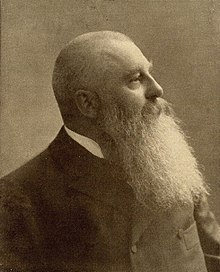Gustav Groß (politician, 1856)
Gustav Groß (born June 12, 1856 in Reichenberg , Bohemia , † February 23, 1935 in Vienna ) was an Austrian politician.
Life
Gustav Groß was the son of the member of the Frankfurt National Assembly and railroad industrialist Gustav Robert Groß . He studied economics at the universities of Vienna and Berlin. From 1877 to 1881 he was a political official in Lower Austria , and from 1885 private lecturer in economics at the University of Vienna . He moved to Jihlava and became a member of the Moravian Landtag , from 1889 he was German liberal Reichsrat for Jihlava and was kk House of Representatives of the Reichsrat one of the spokesmen of all Germans in the Austrian Parliament. He was a member and from 1885 main director of the German School Association , and from 1905 to 1932 first chairman. Great was also an early Karl Marx - biographer .
Gustav Groß, in his function as President of the House of Representatives from 1917/1918 , gave the nine-minute closing address at the Reichsrat meeting on November 12, 1918, the day after Emperor Karl I declared his resignation , without going into the routinely prepared agenda. It began with a short obituary for MP Viktor Adler, who had died the day before . He then declared that the Reichsrat was no longer able to work. At the request of Groß, the decision was made not to set a day for the next meeting . After ten minutes the session that started at 11.10 a.m., the last of the old Austrian parliament, was over. This meeting was followed on the same day at 5:05 p.m. by a meeting of the Provisional National Assembly with the proclamation of German Austria as a republic ; Groß took part as a German-Moravian MP.
As chairman of the Greater German People's Party , Gross was a member of the Provisional National Assembly for German Austria from October 21, 1918 to February 16, 1919 . The German Moravians he represented could not, however, make their settlement area a permanent part of German Austria, since the war winners did not allow this. The new Czechoslovak state , which had militarily occupied the German settlement area in Bohemia and Moravia, did not allow participation in the election of the constituent national assembly for German Austria there. The idea of appointing German MPs for these areas from Vienna as a substitute had to be rejected for reasons of foreign policy.
Gustav Groß had his last apartment in Vienna, 8th district, Fuhrmannsgasse 18-18A - in the house of the German School Association , which he has been leading since 1885, today's Austrian Landsmannschaft .
His final resting place is in the family crypt at the Korneuburg cemetery .
Fonts
- The doctrine of entrepreneurial profit . Duncker & Humblot, Leipzig 1884.
- Gustav Groß: Marx, Karl . In: Allgemeine Deutsche Biographie (ADB). Volume 20, Duncker & Humblot, Leipzig 1884, pp. 541-549.
- Karl Marx: A Study . Duncker & Humblot, Leipzig 1885.
- Economic forms and economic principles. A contribution to the teaching of the organization of economics . Duncker & Humblot, Leipzig 1888.
- The International of Spirit . Working group for citizenship u. economic education, Berlin 1919.
- The international agricultural crises after the war . Kern & Birner, Frankfurt am Main 1933.
Individual evidence
- ^ Österreichisches Biographisches Lexikon, Volume II, Verlag Hermann Böhlau, Graz and Cologne 1959, page 73
- ↑ Stenographic Protocol. House of Representatives. XXII. Session. 95th session, Tuesday, November 12, 1918, pp. 4699 f.
- ↑ Lehmann 1934, Part I, p. 378 (= p. 404 of the digital representation)
literature
- Gross, Gustav. In: Austrian Biographical Lexicon 1815–1950 (ÖBL). Volume 2, Verlag der Österreichischen Akademie der Wissenschaften, Vienna 1959, p. 73.
- Brigitte Deschka: Dr. Gustav Gross. Dissertation University of Vienna 1966.
Web links
- Literature by and about Gustav Groß in the catalog of the German National Library
- Gustav Groß (politician, 1856) on the website of the Austrian Parliament
- Peter Goller: "... stupid criticism of the theories of Marx!" Gustav Groß. An early Austrian Marx biographer. In: Communications from the Alfred Klahr Society, No. 4/2004
| personal data | |
|---|---|
| SURNAME | Great, Gustav |
| BRIEF DESCRIPTION | Austrian economist and politician |
| DATE OF BIRTH | June 12, 1856 |
| PLACE OF BIRTH | Reichenberg , Bohemia |
| DATE OF DEATH | February 23, 1935 |
| Place of death | Vienna |

